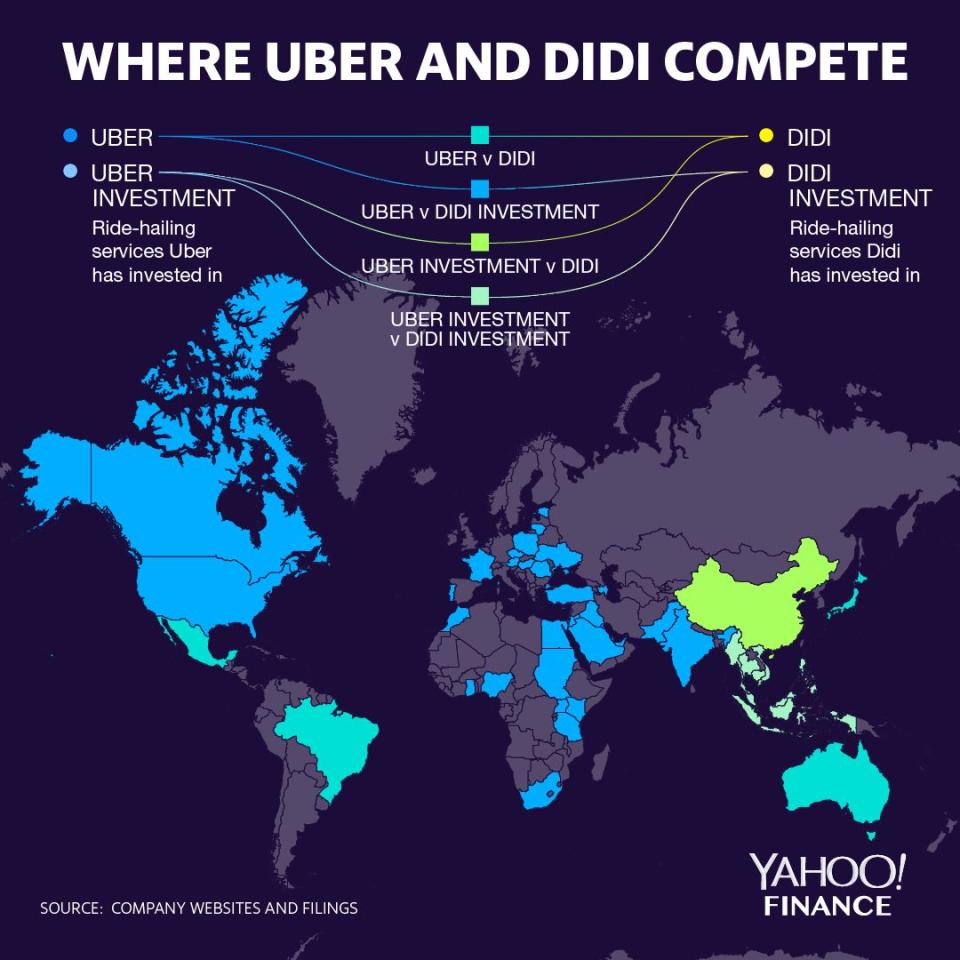Here are all of Uber's worldwide competitors as it prepares for its IPO
Did Uber (UBER) make the right move when it exited the world’s most populous markets?
Financially, the answer seems to be yes for Uber, which makes its public debut on Friday, May 10. The deals have spared Uber from losing billions of dollars and so far they have been sound investments, according to the ride-hailing company’s IPO filing. Uber has already seen some gains from its exit deals with local players, including China’s Didi Chuxing and Russia’s Yandex. Those minority stakes, including 15% in Didi Chuxing, 23% of Singapore-based Grab and 38% of Yandex taxi, collectively contributed $12.5 billion to Uber’s valuation.
But the unusual arrangements also leave Uber competing with its own investments as regional leaders in the industry expand and look for new opportunities to grow.
While Lyft (LYFT) — which reported first-quarter revenue that topped expectations on May 7 — operates only in the U.S. and Canada, Uber is a global transportation empire operating in over 63 countries. The international market is crucial to the company’s growth— markets outside the U.S. account for approximately 74% of all trips booked on its platform in the last quarter of 2018. As Uber is getting a bigger share of the global ride-hailing business, which Grand View Research projects to be worth $11.94 billion by 2025, it will inevitably be battling for market share with companies that it owns minority stakes in.
The San Francisco-based startup expanded abroad in 2011 at a stunning growth rate. Uber launched in a new city each day by the end of 2014. The expansion sent Uber’s valuation ballooning, but not all of its overseas endeavors have panned out very well.
Ride-share wars and Softbank’s role

After years of cash burn in China, Russia and Southeast Asia, Uber exited those markets in exchange for minority stakes in local players there. The deals prohibited Uber from running its own service in those markets for a few years, but the battle continues elsewhere as Didi and Yandex grow in markets where Uber is present. However, Uber’s deal with Didi is still pending the approval from the Chinese government after more than two years.
Now, Uber and Didi are in a face-off in Mexico, Brazil, and Australia. And in some European countries Uber is taking on Yandex.
“These companies have expanded their offerings, and we expect them to continue to expand their offerings in the future, to compete with us in various markets throughout the world,” Uber’s IPO prospectus said.
Didi, for example, is competing with Uber not just by itself, but also through a proxy war. Didi has backed Uber’s rivals in major markets, from India’s Ola, Europe’s Taxify, Brazil’s 99, and a $100 million investment in Lyft on Uber’s home turf. In 2017, Didi also invested in Careem, the Dubai-based ride-hailing service that was acquired by Uber at $3.1 billion in March.
The structure also highlights the vital role of Softbank, the investor that has spun a ride-hailing web across the world. Softbank is behind Didi, Uber, and Grab, and is believed to have helped Uber negotiate its exit deals.
“SoftBank has a lot of say in what they do as a strategic investor in all of them, and I don't think it's good for Softbank, for them to compete with each other,” Zeke Hernandez, an assistant professor in management at the Wharton School of Business, told Yahoo Finance. “What’s good for Softbank is what's happening now, each one is dominant in a certain region of the world.”
This article was originally published on April 15.
Krystal Hu covers technology and China for Yahoo Finance. Write to her viakrystalh@yahoofinance.com
Note: the
Read more:
China builds the world’s longest high-speed rail as a rail stalls in the U.S.

